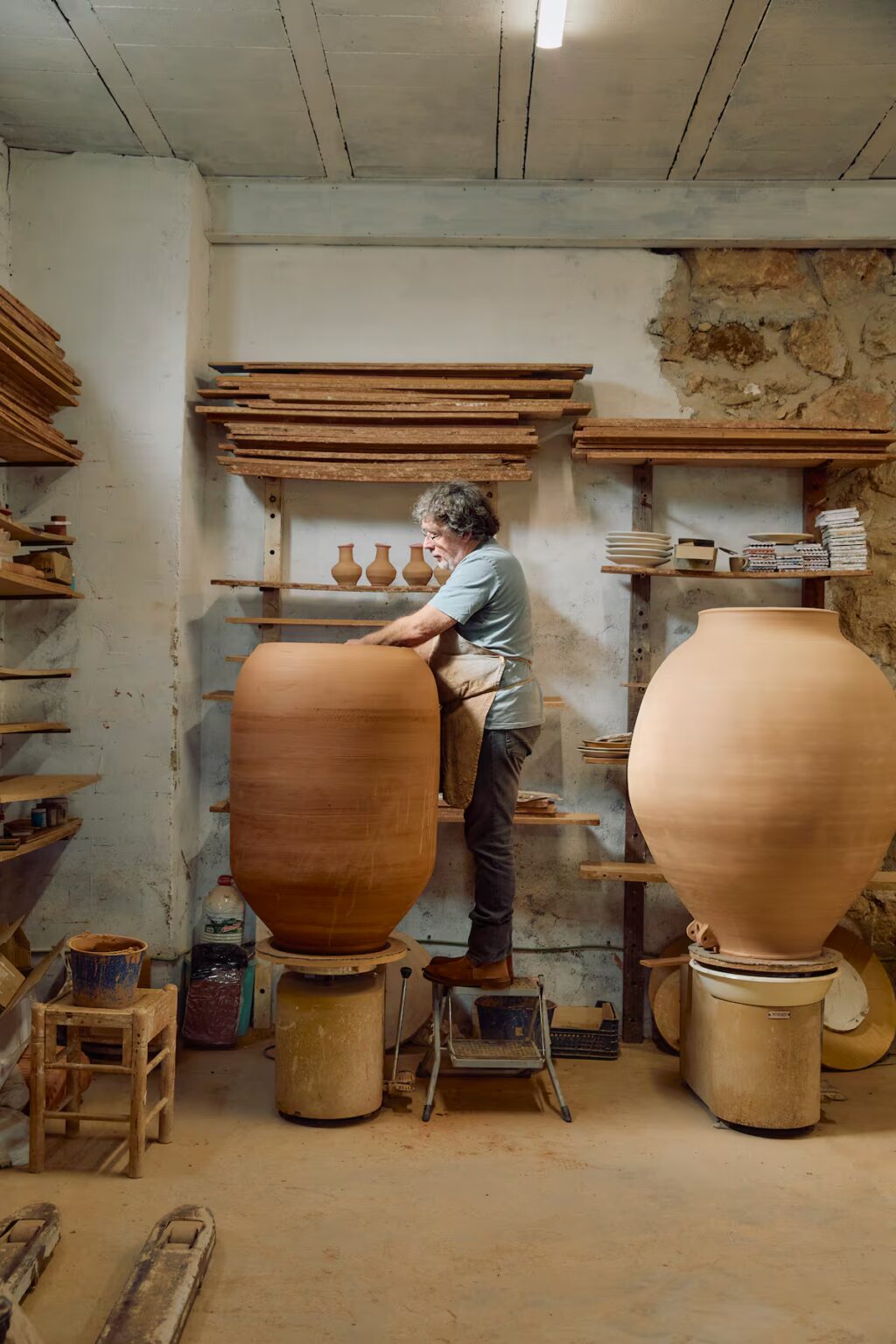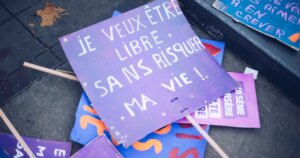
“I don’t have a catalog or a price list. When someone orders me a piece, I ask them about their wines and their way of working, because that’s the first thing I need to understand. If I know who I work for, I think about that person and their wines while I make the piece.” With this declaration of intent, Carles Llarch presents himself in his house in Font-rubí, in Alt Penedès, which is both a laboratory and a home. Just arrive at his door to find an example of his work: large terracotta jars used to produce wine.
Carles is the son of Penedès and comes from a family that has always been linked to the wine sector: his grandfather worked in the vineyard and his father was a wine seller. Among his childhood memories, a special place occupies the grape harvest, to which however he never felt the desire to dedicate himself. At that time, wine in this area was experienced in a very industrial and unattractive way. However, he confesses that as a child he always modeled with plasticine. He would later discover that it was a profession, that of a ceramist.

He studied at the Ceramics Museum of Barcelona and began working on restorations of ancient buildings. During his career in big industry he made everything from tiles for the Sagrada Familia to ashtrays for the hairdressers of Llongueras, but one day he got bored and changed course. “I had a good salary, but I realized I was burying myself in life.” In those years Carles became familiar with large pieces, which, he says, have always fascinated him for the challenge they represent. His interest in amphorae also comes from afar: “I remember that when I was a student, I went to the Wine Museum in Vilafranca del Penedès (the current Vinseum) with a notebook and a pencil, and I began to draw all the models of amphorae and amphorae they had there.”
Today, Carles makes his own handmade terracotta jars, which are highly prized in wine production. He makes them to order and he doesn’t know for sure how many leave his workshop every year, although yes, he doesn’t make them for everyone. “Once a customer asked me for 25 pieces and I told him no, that I could make five or six that year and the same number next year. Eventually I would end up having all 25, but not right away. Having someone order me a large quantity doesn’t help me, because it prevents me from dedicating time to others and I feel like I’m missing out on something.” His way of working isn’t for everyone, but it’s what makes him want to go to the workshop every day. If he left big industry it was precisely to be able to work differently. “It amazes me that I’ve survived this far thinking the way I do. That there are people patient enough to come here and take care of things for me still seems like a miracle to me.”

It takes him weeks to prepare each jar. The first thing he does is select the lands and, depending on what each customer is looking for, he creates one blend or another. Once the clay is prepared, we begin to mold it, a process that takes 10 to 15 days. The clay must dry as the piece grows in height and Carles always lets it do so naturally, avoiding the use of torches which could create micro-cracks. “If it’s a decorative item, nothing happens, but if it’s a utilitarian piece like jars, you’ll lose liquid. Because you don’t want to respect the natural timing, you can end up with a piece that’s not right for you. The best thing is to go slowly and produce less quantity.”
Once the molding is finished, it must dry for between 20 days and a month until it goes into the oven, where it will cook for three days. This transfer is one of the most delicate moments, because before being cooked the pieces break easily like a chocolate bar. All this work is what makes their jars range between 800 and 3,000 euros, depending on the size and accessories you want to add.
To better understand how his pieces work and be able to advise his customers, Carles decided to start producing his own wine with minimal intervention: ViTal. “I thought ‘how can I talk to someone about the wine industry if my specialty is only ceramics?’ We share the same language, but not the same language.” In their wines there is only grapes and nothing else. No fermentation temperature is detected, it is not clarified and no type of machinery is involved. “My grandfather had no thermometer or hydrometer, and he made wine. Even in ancient times they didn’t have all these instruments. It is often said that the Greeks and Romans did not drink good wine, but when you see the glasses they used you realize that they are designs designed to enjoy this drink. They are small ceramic glasses, which fit perfectly on the lip. My intention is to demonstrate that our species did not spend 5,000 years drinking bad wines.”

The way Carles manages his orders and his way of understanding wine and everything that surrounds it generate other types of relationships with his buyers, closer and even more human relationships. “I have a customer in Greece who told me ‘I saw a photo you posted on social media of you hugging a jar and I wanted to meet you’. I embrace my pieces because they are my work, I make them with my hands and I put all my love into them. The jars are like my daughters.”

Gastro Special from ‘El País Semanal’
This report is part of the Gastro Special prepared by “El País Semanal” and EL PAÍS Gastro, which will be published in its paper edition on Sunday 23 November.





